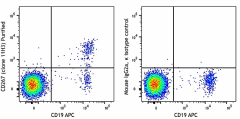- Clone
- 11H3 (See other available formats)
- Regulatory Status
- RUO
- Other Names
- TACI, TNFRSF13B
- Isotype
- Mouse IgG2a, κ
- Ave. Rating
- Submit a Review
- Product Citations
- publications

-

Human peripheral blood lymphocytes were stained with CD19 APC and purified CD267 (clone 11H3) (left) or purified mouse IgG2a, κ isotype control (right), followed by anti-mouse IgG PE.
| Cat # | Size | Price | Quantity Check Availability | Save | ||
|---|---|---|---|---|---|---|
| 398602 | 100 µg | 165€ | ||||
TACI, Transmembrane Activator CAML (calcium modulator and cyclophilin ligand) Interactor, is a 32 kD type III transmembrane protein. It belongs to TNF receptor superfamily, known as TNFRSF member 13B (TNFRSF13B) or CD267. TACI is expressed on B cells, predominantly CD27+ memory B cells, and myeloma cells. TACI contains 2 cysteine-rich domains (CRDs) and 1 potential N-linked glycosylation site in the extracellular domain. Recent studies, however, have shown that another shorter form (TACI_d2) of TACI exists wherein the N-terminal CRD is removed by alternative splicing. TACI_d2 contains full affinity for its ligands. Several proteins (BAFF/BLys, APRIL, Syndecan-2) have been identified as TACI ligands. The interaction of TACI with its ligands induces activation of the transcription factors NFAT, AP1, and NF-κ B. TACI also plays a crucial role in humoral immunity by negative regulation of B cell proliferation and survival.
Product DetailsProduct Details
- Verified Reactivity
- Human
- Antibody Type
- Monoclonal
- Host Species
- Mouse
- Immunogen
- Human TACI transfected cells
- Formulation
- Phosphate-buffered solution, pH 7.2, containing 0.09% sodium azide.
- Preparation
- The antibody was purified by affinity chromatography.
- Concentration
- 0.5 mg/mL
- Storage & Handling
- The antibody solution should be stored undiluted between 2°C and 8°C.
- Application
-
FC - Quality tested
Activation, WB - Reported in the literature, not verified in house - Recommended Usage
-
Each lot of this antibody is quality control tested by immunofluorescent staining with flow cytometric analysis. For flow cytometric staining, the suggested use of this reagent is ≤ 0.25 µg per million cells in 100 µL volume. It is recommended that the reagent be titrated for optimal performance for each application.
- Application Notes
-
Additional reported applications include: western blot5 and inducing of isotype switch signaling in B cells1, suppressing Ab production through TACI signaling2, inducing phosphorylation of PKA in B cells3.
- Application References
-
- Martinez-Gallo M, et al. 2013. J Allergy Clin Immunol. 131: 468-76. (Activation)
- Sakurai D, et al. 2007. Eur. J Immunol. 37: 110-8. (Activation)
- Sakurai D, et al. 2007. Blood. 109: 2961-7. (Activation)
- He B, et al. 2010. Nat. Immunol. 11: 836-45. (FC)
- Garcia-Carmona Y, et al. 2018. Front Immunol. 9: 2125. (WB)
- RRID
-
AB_2820066 (BioLegend Cat. No. 398602)
Antigen Details
- Structure
- A 32 kD type III transmembrane protein and belongs to TNF receptor superfamily, known as TNFRSF member 13B (TNFRSF13B) or CD267. TACI contains 2 cysteine-rich domains (CRDs) and 1 potential N-linked glycosylation site in the extracellular domain. Recent studies, however, have shown that another shorter form (TACI_d2) of TACI exists wherein the N-terminal CRD is removed by alternative splicing.
- Distribution
-
Expressed on B cells, predominantly CD27+ memory B cells, and myeloma cells.
- Function
- Induces activation of the transcription factors NFAT, AP1, and NF-kB and plays a crucial role in humoral immunity by negative regulation of B cell proliferation and survival.
- Cell Type
- B cells
- Biology Area
- Immunology, Signal Transduction
- Molecular Family
- CD Molecules, Immune Checkpoint Receptors
- Antigen References
-
- Gross JA, et al. 2000. Nature 404:995.
- Wu Y, et al. 2000. J. Biol Chem. 275:35478.
- Yan M, et al. 2001. Nat. Immunol. 2:638.
- Hymowitz A, et al. 2005. J. Biol. Chem. 280:7218.
- Bischof D, et al. 2006. BLOOD. 107:3235.
- Gene ID
- 23495 View all products for this Gene ID
- UniProt
- View information about CD267 on UniProt.org
Related FAQs
Other Formats
View All CD267 Reagents Request Custom Conjugation| Description | Clone | Applications |
|---|---|---|
| Purified anti-human CD267 (TACI) | 11H3 | FC |
Compare Data Across All Formats
This data display is provided for general comparisons between formats.
Your actual data may vary due to variations in samples, target cells, instruments and their settings, staining conditions, and other factors.
If you need assistance with selecting the best format contact our expert technical support team.
-
Purified anti-human CD267 (TACI)

Human peripheral blood lymphocytes were stained with CD19 AP...
 Login / Register
Login / Register 








Follow Us